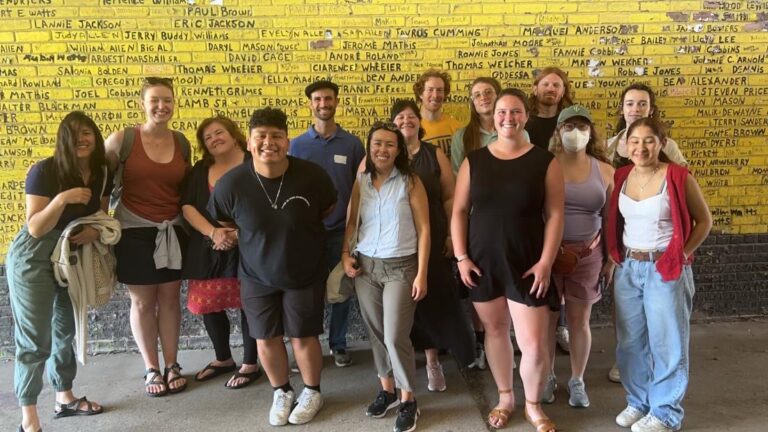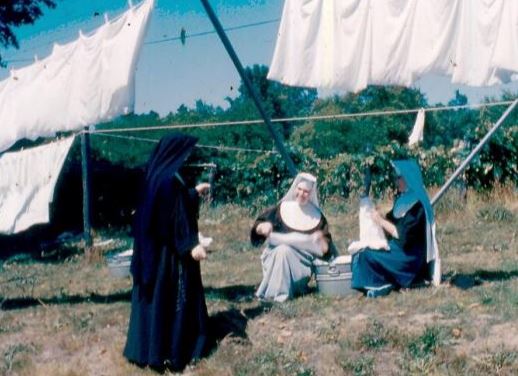As we reel from one crisis to another, 2020 is turning out to be a threshold moment that is challenging us all at once to focus on what is required to build a better world together – for all of us, and for future generations.
Early on in our country’s stay-at-home orders, I received a note from a Jesuit priest I worked with way back in my days as a Jesuit volunteer in Alaska. From his perch in Los Gatos, CA, he said he could look east to the city of San Jose and see a crystal-clear view. But he felt guilty enjoying the smog-free view knowing that its cause was the suffering of so many people affected by the pandemic, and by the economic devastation it has wrought. The current widespread protests and unrest after the killing of George Floyd in Minneapolis are, most justifiably, adding to our collective pain.
We may ask where do we go from here? How do we proceed? This moment has provided a moment of introspection unlike anything in my memory.
Addressing this time, Pope Francis said: “[God is] calling on us to seize this time of trial as a time of choosing. It is not the time of your judgement, but of our judgement: a time to choose what matters and what passes away, a time to separate what is necessary from what is not. It is a time to get our lives back on track with regard to you, Lord, and to others.”
The killing of George Floyd was days ago, but the sin of racism has been with us since our nation was founded. His shameful death viscerally reminded us we are all connected, and that we can no longer remain silent on the issue. The large, diverse, and mostly peaceful protests of overwhelmingly young people give us hope. Even in the middle of a pandemic, they felt it was necessary to take to the streets to make their voices heard. Change is possible.
The pandemic came suddenly just a few months ago (though it feels like a lifetime ago,) and we it caught us all by surprise by how swiftly it changed our world. COVID-19 has led to the loss of more than 100,000 people, and the virus is still out there. It has forced us into a slower pace. Like my Jesuit friend, we are now intimately aware of what slowing down means. At a minimum it shows us just how much of an impact we are having on our fragile planet, and that we have a much better understanding—or a reminder—of a true spiritual practice: simple living. We did not ask for it, but change is possible.
Meanwhile, the climate crisis has unfolded over many years. As people of faith, our connection to the environment is deep. We are both living in God’s creation and we are God’s creation. Our common home has cried out to us many times: hurricanes, flooding, dying reefs, massive fires and droughts that hinder our ability to grow food, disrupting lives and displacing millions, especially poorer communities whose daily living habits contribute the least to pollution. Greenhouse gas emissions keep rising, and we are no closer to solving the climate crisis or significantly changing our lifestyles. Will change be possible?
This year marks the fifth anniversary of Laudato Si’, Pope Francis’s urgent encyclical calling on all of us to truly care for our common home and to embrace integral ecology, the idea that there are inseparable bonds between ecological, economic, social, and political justice. No time in recent history are its words of love but also truth more resonant than today.
“We are not faced with two separate crises, one environmental and the other social, but rather one complex crisis which is both social and environmental,” Laudato Si’ says. “Strategies for a solution demand an integrated approach to combatting poverty, restoring dignity to the underprivileged, and at the same time protecting nature.”
The fifth anniversary of Laudato Si’ has been extended to Laudato Si’ Year, and for the next year we will be praying for the fortitude and wisdom to engage in ambitious action and global change to heal our planet. This includes specifically strategizing for systemic and prolonged action in U.S. Catholic churches and communities to truly care for creation today and into the future.
Now is the time to build a more sustainable world together.
When we emerge from these immediate crisis, I hope we can live out some of the lessons we’ve learned: that society can respond when it must; that we can no longer ignore the disproportionate pain of others; that clean air is possible; that sacrifice for the common good is how societies not only survive, but thrive; and that societies will always be judged by how they care for those most in need.
The simultaneous crises we are living are offering a clearer vision of what is required of us to build a just and sustainable world together. If we muster the will to seize it, change is possible.



